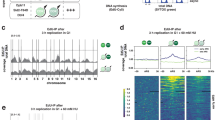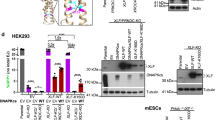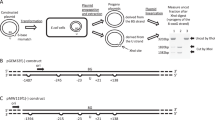Abstract
THE cell cycle of exponentially growing mammalian cells is arbitrarily divided into four phases1. During the S phase, the cells replicate their DNA in preparation for mitosis, but Rasmussen and Painter2 and later others3,4 have shown that ultraviolet and X-irradiation can cause cells in other phases of the cell cycle to initiate DNA synthesis. Such unscheduled DNA synthesis is non-conservative, as shown by density gradient experiments3,5. Because of the similarity between this and repair synthesis in bacteria after ultraviolet radiation (and also because of the reduced unscheduled synthesis in cells from patients suffering from the hereditary disease, xeroderma pig-mentosum, who are extremely sensitive to ultraviolet radiation5), unscheduled and repair syntheses have been equated. After ultraviolet radiation, however, repair of sub-lethal damage (measured by increased survival in split dose experiments) is not observed6 nor, at least in some cell lines, is the excision of thymine dimers7. The large doses of X-irradiation required to give a measurable amount of unscheduled DNA synthesis made correlation with survival difficult. For these reasons, some question has remained about the biological function of unscheduled DNA synthesis.
This is a preview of subscription content, access via your institution
Access options
Subscribe to this journal
Receive 51 print issues and online access
$199.00 per year
only $3.90 per issue
Buy this article
- Purchase on Springer Link
- Instant access to full article PDF
Prices may be subject to local taxes which are calculated during checkout
Similar content being viewed by others
References
Howard, A., and Pelc, S. R., Heredity (Suppl.), 6, 261 (1953).
Rasmussen, R. E., and Painter, R. B., Nature, 203, 1360 (1964).
Painter, R. B., and Cleaver, J. E., Nature, 216, 360 (1967).
Evans, R. G., and Norman, A., Nature, 217, 455 (1968).
Cleaver, J. E., Nature, 218, 652 (1968).
Han, A., Miletic, B., and Petrovic, D., Intern. J. Radiat. Biol., 8, 201 (1964).
Trosko, J., Chu, E. H. Y., and Carrier, W. L., Radiat. Res., 24, 667 (1965).
Elkind, M. M., and Sutton, H., Radiat. Res., 13, 556 (1960).
Yang, S-J., Hahn, G. M., and Bagshaw, M. A., Exp. Cell Res., 42, 130 (1966).
Hahn, G. M., Stewart, J. R., Yang, S-J., and Parker, V., Exp. Cell Res., 49, 285 (1968).
Fox, B. W., and Fox, M., Cancer Res., 27, 2134 (1967).
Brown, O., and Todd, A., in The Nucleic Acids, 1 (Academic Press, New York, 1955).
Lett, J. T., Caldwell, I., Dean, C. J., and Alexander, P., Nature, 214, 790 (1967).
Author information
Authors and Affiliations
Rights and permissions
About this article
Cite this article
HAHN, G., YANG, SJ. & PARKER, V. Repair of Sub-lethal Damage and Unscheduled DNA Synthesis in Mammalian Cells treated with Monofunctional Alkylating Agents. Nature 220, 1142–1144 (1968). https://doi.org/10.1038/2201142a0
Received:
Revised:
Issue Date:
DOI: https://doi.org/10.1038/2201142a0
This article is cited by
-
Unscheduled DNA synthesis in the testis, a secondary test for the evaluation of chemical mutagens
Archives of Toxicology (1980)
-
Removal of 5-bromo-2-deoxyuridine incorporated in DNA of regenerating rat liver
Nature (1977)
-
Quantitative Changes in Unscheduled DNA Synthesis in Rat Muscle Cells after Differentiation
Nature New Biology (1971)
-
Spontaneous Unscheduled DNA Synthesis in G1 HeLa Cells
Nature (1969)
Comments
By submitting a comment you agree to abide by our Terms and Community Guidelines. If you find something abusive or that does not comply with our terms or guidelines please flag it as inappropriate.



